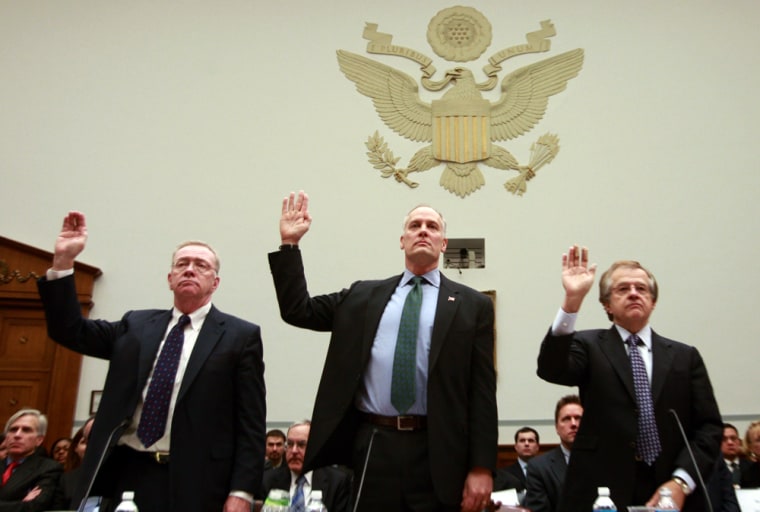Top executives at mortgage finance companies Fannie Mae and Freddie Mac ignored warnings that they were taking on too many risky loans years before the housing market plunged, according to documents released Tuesday by a House committee.
E-mails and other internal documents released by the House Oversight and Government Reform Committee show that former Fannie Mae CEO Daniel Mudd and former Freddie Mac CEO Richard Syron disregarded recommendations that they stay away from riskier types of loans.
“Their irresponsible decisions are now costing the taxpayers billions of dollars,” said Rep. Henry Waxman, D-Calif., chairman of the committee, which reviewed nearly 400,000 internal documents from Fannie and Freddie.
Meanwhile, the National Association of Realtors reported Tuesday that an index of pending U.S. home sales fell only 0.7 percent in October from the previous month. The result beat analysts’ expectations, but partially reflected deeply discounted foreclosures and distressed sales that made up roughly 40 percent of all transactions.
Stocks fell as investors sold shares on downbeat corporate news. The Dow Jones industrials were down nearly 250 points in afternoon trading.
On Capitol Hill, Republicans argued that weak government regulation of Fannie and Freddie and policies to promote homeownership during the Clinton administration were the key causes of the financial meltdown. “We knew a long time ago that this train was going to crash,” said Rep. Christopher Shays, R-Conn.
Democrats acknowledged the two government-sponsored companies contributed to the financial crisis, but stressed that Wall Street banks — not Fannie and Freddie — led the dramatic decline in lending standards that caused mortgages to start defaulting in huge numbers two years ago.
The two companies were seized in September by government regulators. Two months later, Freddie Mac asked for an injection of $13.8 billion in government aid after posting a massive quarterly loss. Fannie Mae has yet to request any government aid but has warned it may need to do so soon.
Fannie and Freddie own or guarantee around half the $11.5 trillion in U.S. outstanding home loan debt. The two companies are the engines behind a complex process of buying, bundling and selling mortgages as investments.
They traditionally backed the safest loans, 30-year fixed rate mortgages that required a down payment of at least 20 percent. But in recent years, they lowered their standards, matching a decline fueled by Wall Street banks that backed the now-defunct subprime lending industry.
Rep. Carolyn Maloney, D.-N.Y., grilled Syron about the Freddie Mac’s decision to fire David Andrukonis, its former chief risk officer.
Andrukonis sounded warnings as far back as 2004 about the risks posed by loans in which borrowers didn’t provide proof of their incomes or detail their assets, according to e-mails released by the committee.
“Do you regret firing him?” Maloney said. “Do you regret buying these risky loans? Do you regret the way you led — and I would say mismanaged — this company?”
Syron said Andrukonis “was fired for a variety of reasons. It was not primarily for his having a view on credit.”
Likewise, lawmakers grilled Mudd about an internal Fannie Mae presentation from June 2005 that showed the company at a “strategic crossroads,” at which it could either delve into riskier loans or focus on more secure ones.
“We couldn’t afford to make the bet that the changes were not going to be permanent,” Mudd said.
Lawmakers, in questioning that lasted more than four hours, were clearly frustrated by what they called a lack of willingness among Syron and Mudd, plus former Fannie Mae CEO Franklin Raines and former Freddie Mac CEO Leland Brendsel, to share any of the blame for the companies’ fortunes.
“All four of you seem to be in complete denial that Freddie and Fannie are in any way responsible for this,” said Rep. Darrell Issa, R-Calif. “Your whole excuse for going to risky and unreasonable loans that are defaulting at an incredibly high rate is that everyone is doing it.”
Repeated attempts to impose tighter regulation on the two companies were thwarted by the companies’ powerful lobbyists.
Raines defended his company’s lobbying, saying that “Fannie Mae, like any other corporation owned by shareholders, came to Congress and expressed its views.”
Internal Freddie Mac budget records obtained by The Associated Press show $11.7 million was paid to 52 outside lobbyists and consultants in 2006 in an attempt to derail stronger regulation. Power brokers such as former House Speaker Newt Gingrich and former Sen. Alfonse D’Amato of New York were recruited with six-figure contracts.
The more difficult questions, however, will come next year, when lawmakers weigh what role, if any, the two companies play should play in the mortgage market
Options include taking the companies private, morphing them into a public utility or a federal agency, or leaving them as government-sponsored entities that have private shareholders and profits, with tougher regulations.
